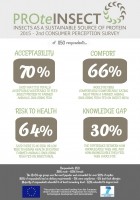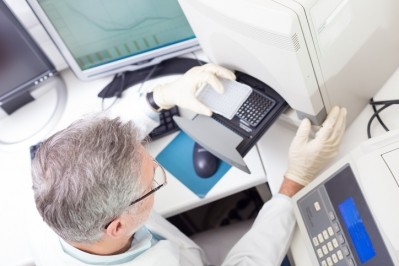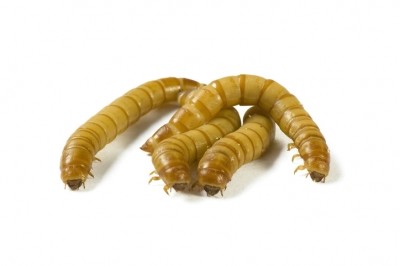Results of insect meal fish, pig and poultry feeding trials released
PROteINSECT: 'The process towards adoption of insect protein in feed (in the EU) is already underway'

“As we seek sustainable, long term solutions we must consider the benefits the introduction of insects, specifically fly larvae, could have on the content of animal feed,” said Dr Elaine Fitches, coordinator of EU funded, PROteINSECT, a platform set up to explore the potential of insect protein for feed and food.
Fitches said the legislative timeline is outside the project’s scope but PROteINSECT was funded because of the need to address the protein deficit in Europe and to understand the potential risk of insect protein in animal feed.
“PROteINSECT is providing relevant evidence to legislators and regulators and the necessary process towards adoption of insect protein in animal feed is already underway; the request by DG Sante for a risk profile, the opinion published by the European Food Safety Authority (EFSA), and PROteINSECT’s white paper and scientific conference are all significant stepping stones in this process,” she told FeedNavigator.
And, in terms of societal acceptance, she noted that in all consumer perception and media activity the team has undertaken they have mapped an increasingly positive attitude towards insect protein in feed.
The PROteINSECT researchers released a summary of the work done since 2013, as the project’s final conference got underway in Brussels today.
Insect meal feeding trials
Its experts, based in Europe, China and Africa, have investigated, over the past three years, the use of two species of fly larvae in the diets of chicken, pigs and fish, carrying out feeding trials and analyzing the quality and safety of rearing farmed flies on organic waste substrates such as manure.
The fish feeding trials involved 3,600 Atlantic salmon parr over an eight week period. The researchers found defatted insect meal has potential to replace more than 50% of fish meal in the diets of those fish.
PROteINSECT also carried out pig feeding trials. They involved 48 male castrated piglets over a four week period at concentrations of 2% crude insect meal and 1.25% extracted insect proteins. The researchers said, when compared to piglets reared on a commercial diet, there were no significant differences in body weight, daily gain, feed intake and feed conversion ratios observed in the insect meal fed piglets.
Levels of good micro-organisms (Lactobacilli) were significantly higher in insect-fed piglets, they noted. No differences in levels of negative micro-organisms (Enterobacteriaceae and E.Coli) were detected.
Insect meal and extracted insect proteins in the piglet feed created a healthy environment within the gastrointestinal tract of the animals, added the scientists.
PROteINSECT also conducted poultry feeding trials on 300 male Ross chickens over a 39 day period at concentrations of 2% crude insect meal and 1.25% extracted insect proteins with birds fed on a commercial diet used as a control. The results indicated that no significant differences could be observed in animal performance.
Regulatory overhaul
The PROteINSECT team said in order for all stakeholders to really "grasp the insect opportunity", the EU executive must now take the next steps on the regulation front.
The Commission, they said, must review two pieces of EU legislation, namely Regulation EC 999/2001, which prohibits the use of insects as a source of protein for livestock feed and Regulation EC 1069/2009, which bans the rearing of insects on manure or catering waste.
In addition, EFSA needs to carry out a full risk profile for insects reared on organic wastes, to build on its risk assessment of insects last year, said PROteINSECT.
“Quality and safety of larvae reared on organic waste substrates is a core scientific output of PROteINSECT. We are fully engaged with EFSA to ensure state of the art evidence is available to support ongoing risk assessment,” said Fitches.
The International Platform of Insects for Food and Feed (IPIFF), a non-profit organization representing the interests of private players in the insect industry, also weighed in on the regulatory side.
The trade group noted in light of the positive fish feeding trial outcomes from the PROteINSECT initiative and similar industry led research findings, coupled with EFSA’s assessment pointing towards the safety of processed insect proteins when plant based substrates are used, the Commission should authorize their use in aquaculture, in line with other non-ruminant animal proteins.
“PROteINSECT’s examination of the use of substrates currently banned in the EU is interesting from a long-term perspective. However, IPIFF members will only envisage commercial applications for insects raised on such substrates when full assurance on the safety of such materials has been provided,” added the IPIFF.
Insect meal production
Commercial insect rearing already exists both within and outside Europe.
Dutch producer, PROtix Biosystems, has developed scalable insect production systems to produce insect meal and purified oil, as well as chitin as a basis for derivatives like chitosan.
The Spanish spin-out, Bioflytech, specializes in rearing a range of fly species producing biomass for feed with additional focus on the use of insects in the development of technologies for waste valorization.
French company, Ynsect, has generated €14m in investment to date. It is focused on ensuring full automation of its insect production and processing facility. Ynsect currently produce over one ton proteins and derivatives, lipids and chitin and derivatives per day.
Infrastructure
PROteINSECT’s white paper also includes an evaluation of the most promising technologies for insect protein processing, In addition, it looked at killing methods to ensure insect welfare as well as worker safety.
“Fly larvae from our own rearing systems in Europe, Africa and China have been assessed against innovative technologies at lab and pilot scale. Following this evaluation, PROteINSECT has concluded that solvent extraction methods achieve the best results for physical, chemical and enzymatic profiles.”
Compared to fishmeal, the researchers also found the house fly and black soldier fly production systems have shown more favorable results in terms of impact on fossil fuel depletion, freshwater and marine eutrophication and ecotoxicity, as well as natural land transformation.
The scientists said they also identified possible improvements within the systems to further reduce heating related energy usage, labor and water inputs: “However, it should be noted that European producers are already undertaking this work,” reported the PROteINSECT white paper.














